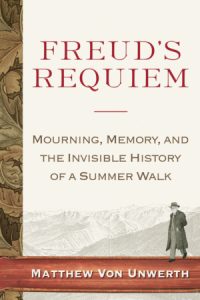Book Reviews
Review Excerpts
The Guardian – April 29, 2006
“In Freud’s Requiem, Matthew von Unwerth speculates on a summer walk that never happened, a bond of friendship never forged, and the transience of material existence… a witty variation on the current vogue for biographical ‘micro-history’… There is a dream-like quality to the imagined walk… It seems at times as if Freud’s Requiem were less micro-history than late Romantic prose poem, endowed with its own unconscious life and dreaming of other walks in other turbulent times during which other conversations took place.”
— Frances Wilson
American Journal of Psychiatry – February 2006
“Brilliant… Matthew von Unwerth… has written a beautiful and moving account of the intellectual and philosophic implications of Freud’s brief pre-World War I contact with the poet Rainer Maria Rilke… Freud’s Requiem succeeds in becoming an elegant series of meditations on death, creativity, mourning, and memory. This book reminds us of the philosophic depth that was implicit in the original psychoanalytic enterprise. Unwerth writes with such a light hand that his subtle way of expressing himself fully matches the unusual gracefulness of Freud and his early followers.”
— Paul Roazen, Ph.D
Forward – October 28, 2005
“[Freud’s Requiem] is a meditation, a fugue — conceivably a psychoanalytic novel that has at its nexus Freud’s brief essay ‘On Transience’… Von Unwerth then infuses these themes with life, as he imaginatively connects them to real people and events in Freud’s life and to the questions that engaged him… [The book] succeeds in conveying the essence of the psychoanalytic state of mind, multisectioned and multilayered, in which fantasy and reality, ideas and their opposites, and past, present and future coexist… The aftereffect of Freud’s Requiem is a shimmering facsimile of psychoanalytic creation.”
— Dinah M. Mendes
History News Network – October 11, 2005
“Freud’s Requiem is a brief, maddeningly dreamlike examination of some crucial aspects of Freud’s life and thought…. The end result is… warmly humanistic, lyrical, elegiac, and profound – a haunting examination of what Freud and psychoanalysis can teach us about death, mourning, memory, love, and creativity… It is to Matthew von Unwerth’s everlasting credit that his book about Freud’s strange, eloquent little essay has managed to take on the qualities of its subject while remaining a significant contribution to the history of ideas.”
— Leslie Kitchen
The Anniston Star – August 28, 2005
“Relying as much on Freud’s imagination as on his razor sharp memory, Unwerth delivers an off-kilter tale of three intersecting lives and a supposed mountain walk in the Dolomite Mountains in the summer of 1913. He challenges our assumptions about life, death, mourning, longing, even hopefulness. In the end it is a brisk workout for the curious mind, a narrative that rises above biography, often approaches brilliant prose, and chronicles, finally, a time when the world was blown apart by modern weapons and exceptional thinkers.”
The Providence Journal – August 14, 2005
“Beautifully written, evocative and lyrical… Von Unwerth conjures up and gracefully reproduces Freud’s psychoanalytical theories, linking them to Freud’s own life… Von Unwerth’s suggestive and supple prose links the growth of Freud’s mind to his biography, a fine way to root the investigations of the psyche in the fertile soil of his own existence. It makes for a fascinating tale.”
— Sam Coale
Speakeasy/The Loft – Summer 2005
“Matthew von Unwerth uses Freud’s ‘literary version’ of the encounter between the psychoanalyst and the poet as a device for exploring aspects of the life and work of Freud, and, to a lesser extent, Rilke… Freud’s Requiem is a partial – in both senses of the word – account of two contrasting, historically significant figures. This is its strength and its charm.”
— Patrice Clark Koelsch
New York Times Book Review – August 7, 2005
“Elegant… Although psychoanalytic ideas provide a backdrop, von Unwerth is equally interested in the characters and experiences – contemporary and historical – that informed Freud’s thought… Small matter that there isn’t much of a central thread in all this: von Unwerth’s unconventional approach is refreshing, and his literary fluency brings vitality to a well-worn subject.”
Library Journal (Starred Review) – July 2005
“This requiem by von Unwerth… is delicate, powerful, and full of beauty, suggesting in prose that floats like music that Freud’s insistence on real mourning is more mature than Rilke’s avoidance and wishful thinking… The lives of these two masters of language and thought make such a powerful story that one wonders why it took so long to hear it. Essential for most libraries and for humanists and scientists alike.”
Kirkus Reviews – June 15, 2005
“[Von Unwerth] takes us back to 1913 when Freud began a brief relationship with poet Rainer Maria Rilke, a meeting that occasioned ‘On Transience’… An interesting disquisition on a small moment that would loom large in Freud’s imagination.”
Publishers Weekly – May 23, 2005
“[A] lyrical meditation… Emphasizing the literary qualities of Freud’s work, and providing various proofs of the aging psychoanalyst’s nostalgic relationship to his own past, including the locales of his childhood and the experience of lost adolescent love, Unwerth proffers biographical interpretations of Freud’s theories on love, attachment, narcissism, grief and mourning in an accessible, intriguing, and daringly speculative study of a little-known work by the ‘father of psychoanalysis.’”

